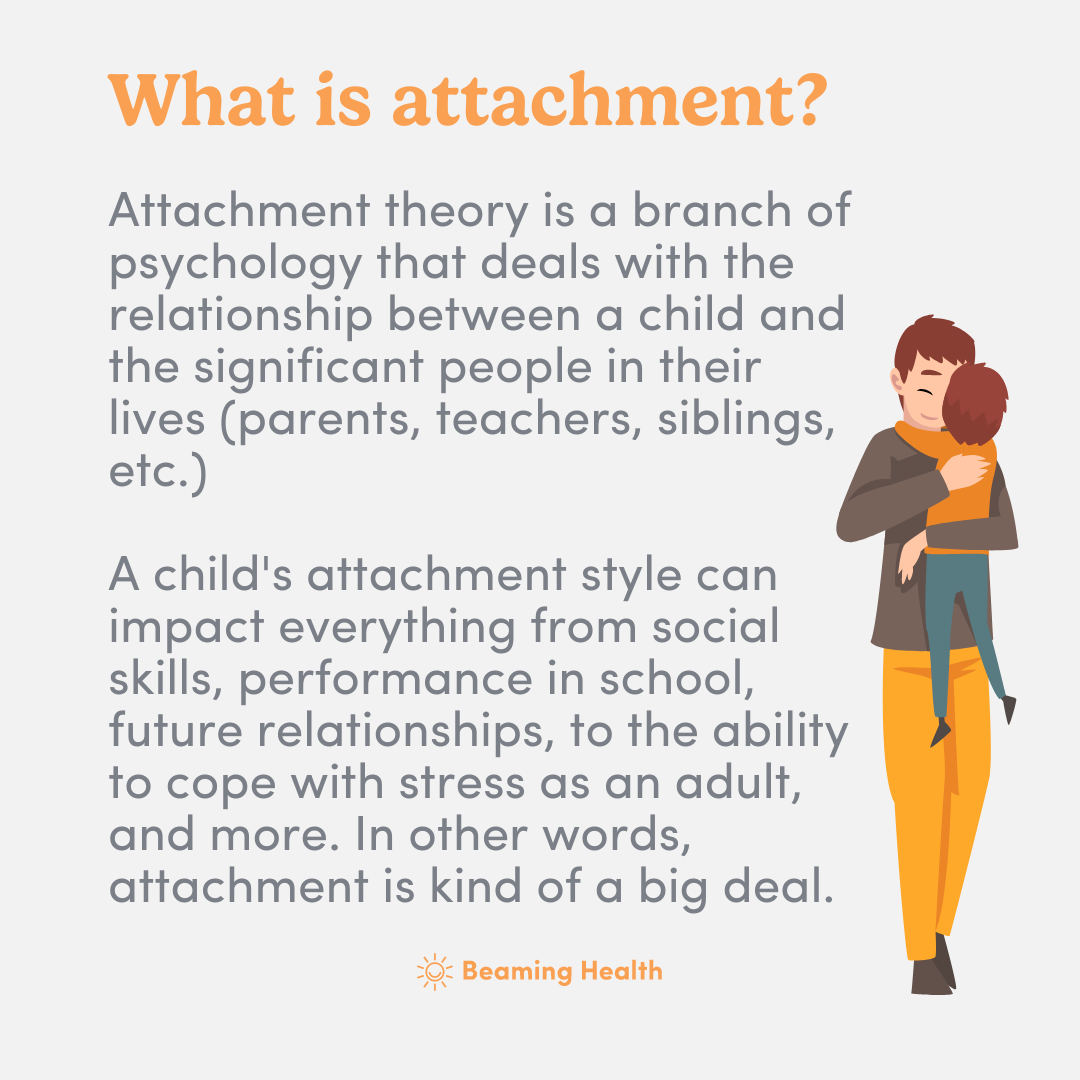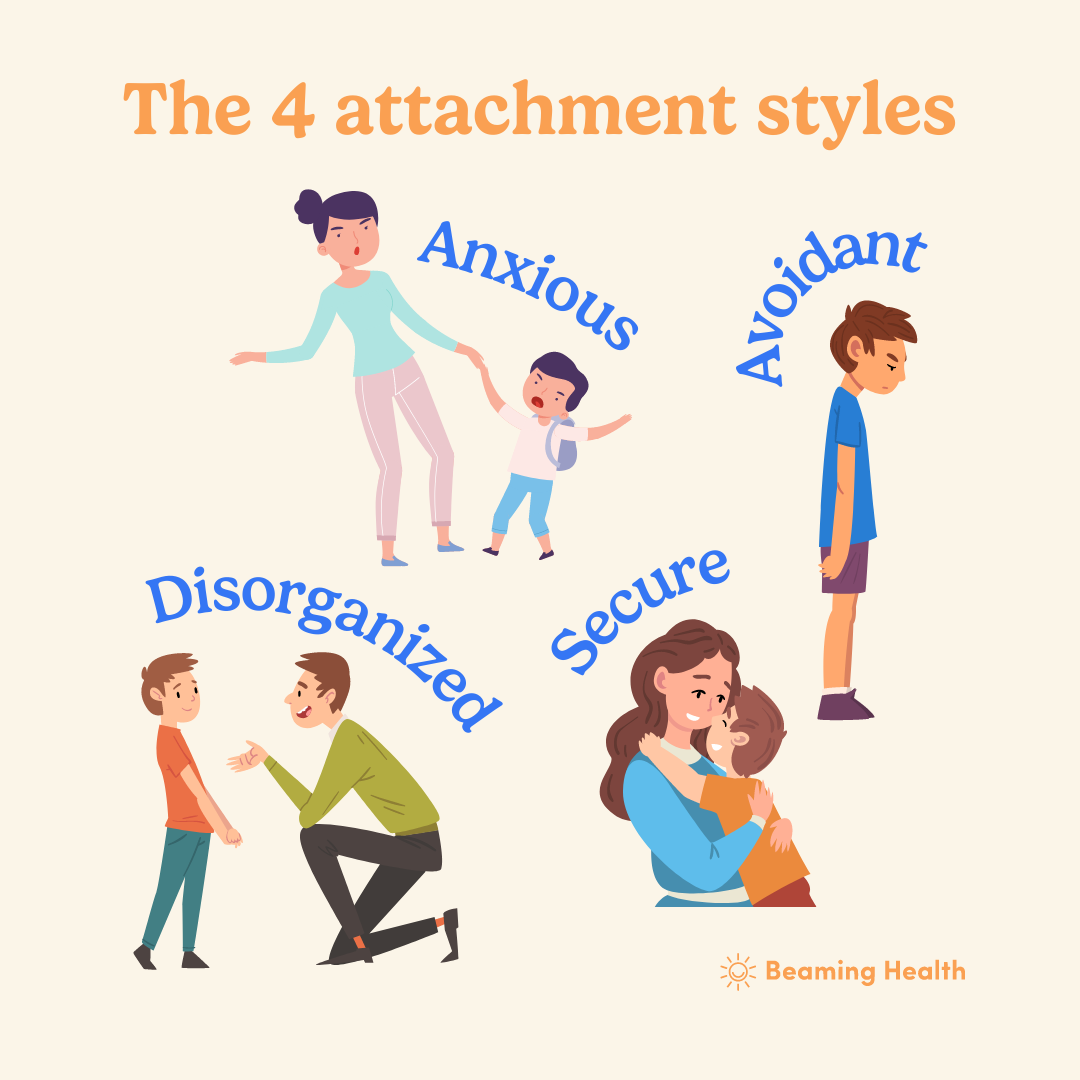Does my autistic child love me? 4 attachment styles you need to know
Updated: February 6, 2024 · 6 Minute Read

Reviewed by:
Amy Gong, Neurodiversity Advocate
Highlights
- Kids on the spectrum are fully capable of love, empathy, and connection, even though it may feel like they’re “hard to reach” sometimes.
- Autistic children may not express love in “typical” ways, and some may have difficulty understanding and expressing their feelings.
- Secure attachment is a safe and responsive relationship that allows kids to feel confident exploring the world around them.
It’s something we’ve all wondered: does my autistic child love me? Do they understand how much I love them? Sometimes, as special needs parents, it may feel as if we’re replaceable in our child’s life — just a caregiver. But is that true? If you’ve ever wondered about your relationship with your kiddo, you’re not alone. Let’s get “in our feelings” a little bit as we explore this emotional topic.
Does my autistic child love me?
Autistic children are able to feel the full range of human emotions, including love.1 However, they may not always be able to recognize or express those emotions in typical or conventional ways.
The concept of “love” — a complex emotion that most adults don’t even have figured out yet — is tricky for many children, not just kids on the spectrum. This is because children are, by nature, egocentric. This means it’s hard for them to see or appreciate perspectives outside their own. (For example, “I like chocolate ice cream, so Mommy must like chocolate ice cream, too.”)
The concept of love may be even more difficult to wrap one’s head around for an autistic child, because their understanding of social norms and reciprocation can be very different from that of a neurotypical child. For example, a neurotypical child may quickly learn to say “I love you” back, even if they don’t understand it, whereas an autistic child may not “get” the significance of the gesture.
While we’d all like reassurance that our children love us, it’s a concept that may be out of reach for them right now. The more appropriate question would be “does my child have a secure attachment to me?” This shifts the focus to forming a strong, secure bond with our children so that we can have healthy, loving relationships with them long into the future.

What is secure attachment?
Secure attachment is one type of bond found in attachment theory, which is a branch of psychology that deals with the relationships between children and the people in their lives. It represents a healthy, secure relationship in which your child is attached to you and trusts you, without being too attached or detached.
What do I need to know about secure attachment?
Your responsiveness and availability are vital to forming a secure attachment. You feed them, you kiss their boo-boos, you change their dirty diapers, you hold them and comfort them. You chase them around the room, tickle them, and listen to their silly stories. To a child, responsiveness (including play), focused attention, and having their needs met are the ultimate expressions of trust and safety. It means you’re their person — the one they can count on no matter what. To a child, this is love.
Your relationship with your child is the foundation they build their lives on. A securely attached child feels safe and secure enough with their parent/caregiver to grow in independence and exploration. Being with your child and helping them navigate feelings and experiences actually helps their brain develop and grow.2 These social interactions are an important part of your child’s development! The way we care for our kiddos can even affect how they manage stress in their bodies.2
Attachment style is a big deal, but not all attachments will be secure. A child may have a different attachment style for each parent or caregiver in their life. The type of attachment style a child has with their parents can affect their entire life — everything from school performance, self-esteem, career, future romantic relationships, and more. As hard as we try to be “good” parents, we may still not securely attach with our children.

What are the other attachment styles?
There are 4 attachment styles widely accepted in attachment theory. One is secure, and the others are classified as “insecure”. Please note that these attachment styles are described here using the behaviors of neurotypical (non-autistic) children. We need more research to know what attachment styles might look like in kids with autism.
- Avoidant — Children with an avoidant attachment may seem aloof or uninterested in their caregiver. Avoidant adults or kids could be described as detached or disconnected emotionally from loved ones. They tend to soothe themselves and don’t tend to seek comfort or help from the caregiver/parent. They may avoid their caregiver altogether and have no preference between the parent or a stranger.3
- Secure — A securely attached child misses their parent/caregiver when they’re gone and is happy to see them return. They may accept comfort from others when their preferred caregiver isn’t around, but they still seek out the preferred caregiver. They can view their parent as a safe base or launchpad to explore the world from.3,4
- Resistant (sometimes called “Anxious”, “Anxious-Avoidant”, or “Ambivalent”) — Child appears to be highly distressed or anxious when separated from their caregiver, but may not be able to regulate quickly when reunited with them. They may be angry with their caregiver and resist their attempts to soothe them, while being worried or anxious about being apart from them.4,5 Anxious attached kids are sometimes described as clingy, dramatic, or demanding.
- Disorganized — This is a fourth type of attachment that describes a child who shows a mixture of attachment behaviors. This can occur when the child both fears and wants comfort from their caregiver.4 This attachment style can form from caregivers who are inconsistent or even abusive with their child, causing the child confusion. The child wants to seek out the parent for comfort and safety, but isn’t sure if they should because the parent may have shown in the past they aren’t safe or won’t respond warmly.
Conclusion
Attachment style is kind of a big deal. Decades of research have shown a link between attachment style and pretty much every part of a child’s life: school, home, future relationships, career, and self-esteem. Attachment style can be even more important for autistic and neurodivergent kids, who can have difficulty relating to the neurotypical world around them.
Get our best articles delivered to your inbox each month.
We respect your privacy.
Dive Deeper
Article References
- Do People With Autism Have “Normal” Empathy & Emotions?. The Elemy Learning Studio. Published June 8, 2020. http://www.elemy.com/studio/autism/empathy-and-emotions/
- Divecha, D. What is a Secure Attachment? And Why Doesn’t “Attachment Parenting” Get You There? — Developmental Science. Developmental Science. Published April 3, 2017. https://www.developmentalscience.com/blog/2017/3/31/what-is-a-secure-attachmentand-why-doesnt-attachment-parenting-get-you-there
- Health (UK) NCC for M. Introduction to Children’s Attachment. National Institute for Health and Care Excellence (UK); 2015. https://www.ncbi.nlm.nih.gov/books/NBK356196/#:~:text=Children%20who%20have%20a%20resistant
- Cherry K. What You Should Know About Attachment Styles. Verywell Mind. Published 2020. https://www.verywellmind.com/attachment-styles-2795344
- Symons, D.K., Szielasko, A.L. (2011). Insecure-Resistant Attachment. In: Goldstein, S., Naglieri, J.A. (eds) Encyclopedia of Child Behavior and Development. Springer, Boston, MA. https://doi.org/10.1007/978-0-387-79061-9_1506
- Divecha, D. What is a Secure Attachment? And Why Doesn’t “Attachment Parenting” Get You There? — Developmental Science. Developmental Science. Published April 3, 2017. https://www.developmentalscience.com/blog/2017/3/31/what-is-a-secure-attachmentand-why-doesnt-attachment-parenting-get-you-there
- Dugdale AS, Thompson AR, Leedham A, Beail N, Freeth M. Intense connection and love: The experiences of autistic mothers. Autism. 2021;25(7):1973-1984. doi:10.1177/13623613211005987
- Mothers With Autism Face Higher Rates of Postpartum Depression. PracticeUpdate. Accessed October 19, 2022. https://www.practiceupdate.com/content/mothers-with-autism-face-higher-rates-of-postpartum-depression/96067













